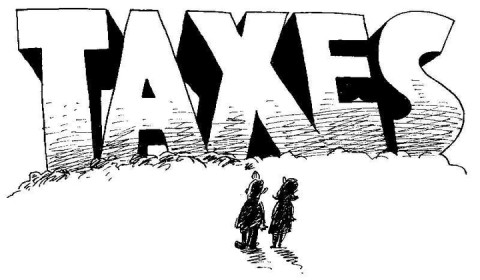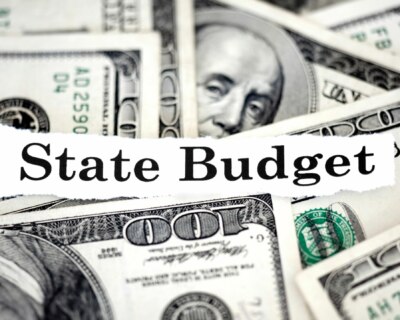
Taking Inventory of Louisiana’s Outdated Tax
By Adam Crepelle
Governor Jindal may be technically correct when he says that eliminating Louisiana’s inventory tax credit is not a tax increase, as tax rates do not rise when a credit is repealed. Nevertheless, the actual effect of the repeal is to place a greater tax burden on businesses subject to the inventory tax.
The inventory tax credit is like a jacket that companies operating in Louisiana use to stay warm in a chilly business environment. By some measures, Louisiana is a one of the less appealing business climates in the United States–ranked 35 out of 50 in a recent Tax Foundation study.[i] The state’s tax policy is major reason why, and one of the worst taxes on the Louisiana books is the inventory tax.
Inventory taxes are local ad valorem taxes imposed on the personal property of businesses and they have been imposed in Louisiana since the 1800s.[ii] The inventory tax requires Louisiana businesses that manufacture or sell merchandise in excess of $15,000 to keep an inventory of their merchandise, equipment, and any other asset describing the quantity and value of the goods.[iii] Businesses are required to keep accurate records of all their transactions related to the sale of goods.[iv] Understandably, businesses do not appreciate this burden.
By the 1980s, many Louisiana lawmakers understood that the inventory tax had a detrimental effect on the state’s ability to attract and retain businesses.[v] Though abolishing the inventory tax would help Louisiana attract investments from outside the state, local governments were not eager to relinquish one of their primary revenue sources.[vi] The legislature’s attempt to assuage businesses while placating local governments led to the passage of the inventory tax credit.
Tax credits reduce the amount of taxes a taxpayer owes,[vii] and refundable tax credits can extend beyond what the taxpayer owes.[viii] The inventory tax credit is 100 percent fully refundable.[ix] Herein lies the issue with processing the inventory tax credit: Businesses report their inventories to their local assessor, parish governments set the inventory tax rate while the state pays the credit. That is, parish governments decide how much businesses pay in inventory taxes; businesses pay the tax then send the bill to the state; and the state sends businesses a check for the full amount of the payment. The inventory tax credit program has created an unhealthy situation where businesses need not worry about how high the inventory tax rate rises.
Although businesses may overlook the inventory tax, the state has a very compelling reason to worry about the levy’s amount–the state pays the bill. Yet the current inventory tax credit program has left the state largely feckless in determining inventory tax rates. This provides parish governments with an incentive to increase inventory assessed values and tax rates because businesses are insulated from the tax and the state can do little to lower rates. However, this convoluted process appears to be coming to an end thanks to the state’s budgetary woes.
The inventory tax credit is charged as one of the chief culprits of the state’s financial problems. A 2013 report from the Louisiana Legislative Auditor claims the inventory tax credit cost the state $1.46 billion in lost revenue from 2006 to 2011 making it the state’s most expensive tax credit.[x] According to the report, tax credits cost Louisiana $5.44 billion in lost revenue from 2006 to 2011.[xi]
The figures in the Legislative Auditor’s report rely on information from the Louisiana Department of Revenue (LDR).[xii] However, the LDR calculated the inventory tax credit’s fiscal effect primarily by using tax return data.[xiii] This means the cost simply reflects the revenue businesses would have paid in taxes had there been no credit. But the report does not consider the possibility that businesses may be less productive, and some may not even remain in Louisiana, but for the inventory tax credit. This is an important consideration that policymakers must take into account when assessing the inventory tax credit.
All things being equal, low tax rate environments are more appealing economically than high rate tax environments. The concept is so straightforward that it barely seems worth explaining. Nonetheless, those calling to increase state revenue by eliminating the inventory tax credit need to be reminded that taxes make doing business more expensive. The more expensive an activity is, the less a person can engage in it.
For example, a mom-and-pop shop wants to grow. Repealing the inventory tax credit results in mom and pop devoting more of their income to taxes. This makes growth more difficult because more money spent on taxes means less money is available to invest in expansion. Less business growth means fewer employment opportunities; after all, businesses–notwithstanding Hillary Clinton’s statement to the contrary[xiv]–create jobs.
If the inventory tax credit were repealed, higher priced goods are a probable consequence. The price of goods will likely rise as businesses attempt to pass the increased cost of doing business onto consumers.[xv] The inventory tax applies to virtually everything that is sold, so those with the least means will be hit the hardest by the price increases. This is why the inventory tax has been called “a regressive tax that fosters inequities”[xvi] and discarded by all but approximately 15 states.[xvii]
A recent article in The Advocate notes the inventory tax credit helped Louisiana land distribution centers.[xviii] The article also notes wholesale trade employment decreased after the inventory tax credit took full effect.[xix] Several factors, such as mechanization and more favorable tax climates in other states, may explain the decrease in wholesale employment. It is unclear exactly how much the inventory tax credit has influenced Louisiana’s economy since it came into full effect in 1998; however, it is clear that businesses were able to re-invest their inventory tax savings back into the private sector economy.
Finding research on the inventory tax’s effect on economies is challenging because nearly every state has abandoned the ancient tax. Louisiana Economic Quarterly states the inventory tax credit is “a boon to many small businesses.”[xx] Furthermore, the inventory tax has a more pernicious impact on small businesses than big corporations. Large retailers can set up shop in a state without the inventory tax and ship merchandise into Louisiana when needed in an effort to reduce the inventory tax.[xxi] Small businesses are equally likely to try and minimize the inventory tax but lack the resources to maneuver merchandise as successfully as big corporations. When efforts to escape the inventory tax result in firms placing inventory outside of Louisiana, jobs will disappear from the state along with the inventories, and this translates into a smaller tax base. This would unfortunately return our state to its pre-inventory tax credit days.
And the evidence suggests businesses are willing to change venues if taxes and regulations become overly onerous. Chief Executive magazine ranks Texas the best state to do business and California as the worst. [xxii] Predictably, companies are leaving California for Texas.[xxiii] The same principle is on display at the international level as American companies are changing their domiciles to elude the United States’ high corporate tax rate.[xxiv] Meanwhile, Ireland’s low corporate tax rate is enticing many international corporations to become citizens of the island.[xxv]
These examples indicate that erasing the inventory tax credit will have deleterious effects on Louisiana’s economy. Therefore, Louisiana lawmakers may want to explore eliminating the inventory tax completely. This approach could enhance Louisiana’s economic development by requiring local governments to find less destructive ways to fund their operations.
Adam Crepelle is a student at Pepperdine University’s School of Public Policy and a graduate of the Southern University Law Center and the University of Louisiana at Lafayette.
[i]http://taxfoundation.org/article/2015-state-business-tax-climate-index
[ii]http://blogs.theadvocate.com/specialreports/2014/12/05/giving-away-louisiana-inventory-tax-refund/
[iii]http://www.legis.state.la.us/lss/lss.asp?doc=101425&showback=
[iv]http://www.legis.state.la.us/lss/lss.asp?doc=101425&showback=
[v]http://blogs.theadvocate.com/specialreports/2014/12/05/giving-away-louisiana-inventory-tax-refund/
[vi]http://blogs.theadvocate.com/specialreports/2014/12/05/giving-away-louisiana-inventory-tax-refund/
[vii]http://www.irs.com/articles/what-is-a-tax-credit
[viii]http://www.irs.com/articles/refundable-tax-credits
[ix]http://www.lla.state.la.us/PublicReports.nsf/54DC39936371BC2386257B3400666D2D/$FILE/00030ED1.pdf at B.2
[x]http://www.lla.state.la.us/PublicReports.nsf/54DC39936371BC2386257B3400666D2D/$FILE/00030ED1.pdf at C.1
[xi]http://www.lla.state.la.us/PublicReports.nsf/54DC39936371BC2386257B3400666D2D/$FILE/00030ED1.pdf at C.3
[xii]http://www.lla.state.la.us/PublicReports.nsf/54DC39936371BC2386257B3400666D2D/$FILE/00030ED1.pdf at A.1
[xiii]http://www.revenue.louisiana.gov/publications/TEB(2013).pdf at 2
[xiv]http://www.politifact.com/truth-o-meter/article/2014/oct/30/context-hillary-clinton-and-dont-let-anybody-tell-/
[xv]http://smallbusiness.chron.com/must-file-inventory-tax-72059.html
[xvi]http://digitalcommons.georgiasouthern.edu/cgi/viewcontent.cgi?article=1104&context=savannah&sei-redir=1&referer=https%3A%2F%2Fscholar.google.com%2Fscholar%3Fstart%3D70%26q%3D%2522inventory%2Btax%2522%26hl%3Den%26as_sdt%3D0%2C5%26as_ylo%3D1990%26as_yhi%3D2015#search=%22inventory%20tax%22
[xvii]http://smallbusiness.chron.com/must-file-inventory-tax-72059.html
[xviii]http://blogs.theadvocate.com/specialreports/2014/12/05/giving-away-louisiana-inventory-tax-refund/
[xix]http://blogs.theadvocate.com/specialreports/2014/12/05/giving-away-louisiana-inventory-tax-refund/
[xx]http://www.opportunitylouisiana.com/assets/LED/docs/EQ/2010/EQ_Q1_10.pdf at 25
[xxi]http://digitalcommons.georgiasouthern.edu/cgi/viewcontent.cgi?article=1104&context=savannah&sei-redir=1&referer=https%3A%2F%2Fscholar.google.com%2Fscholar%3Fstart%3D70%26q%3D%2522inventory%2Btax%2522%26hl%3Den%26as_sdt%3D0%2C5%26as_ylo%3D1990%26as_yhi%3D2015#search=%22inventory%20tax%22
[xxii]http://chiefexecutive.net/best-worst-states-for-business-2013
[xxiii]http://www.newsmax.com/Reagan/Companies-California-Texas-Perry/2014/04/04/id/563795/
[xxiv]http://democrats.waysandmeans.house.gov/sites/democrats.waysandmeans.house.gov/files/images/A_Spike_in_Corporate_Inversions_2.pdf
[xxv]http://www.forbes.com/sites/taxanalysts/2013/11/06/if-ireland-is-not-a-tax-haven-what-is-it/




